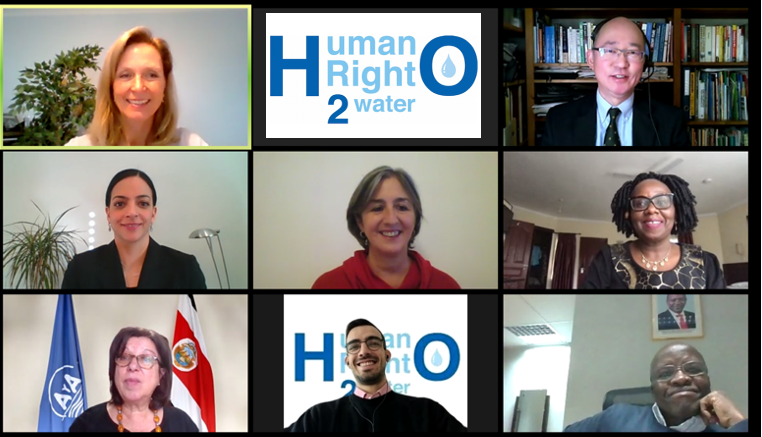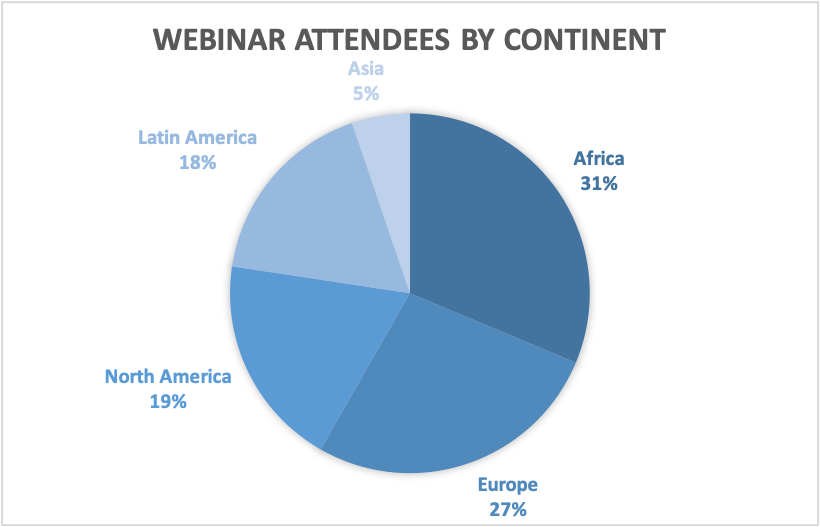
Read more about our panellists here
The 10th December marks Human Rights Day, the moment when the United Nations General Assembly adopted the Universal Declaration of Human Rights, back in 1948. The 2020 theme is ‘Recover Better – Stand Up for Human Rights’, addressing the largest international crisis in years with the global pandemic. Human Right responses are more than ever, imperative.
For this reason, Human Right 2 Water brought together experts from Costa Rica and Kenya, along with legal experts from the same regions, to discuss how strengthening the human rights to water and sanitation can create a long-term positive impact, not only on the right to water and sanitation, but also for the right to health.
“We will reach our common global goals only if we are able to create equal opportunities for all, address the failures exposed and exploited by COVID-19, and apply human rights standards to tackle entrenched, systematic, and intergenerational inequalities, exclusion and discrimination.”OHCHR, Human Rights Day 2020
Human Right 2 Water’s CEO, Amanda Loeffen initiated the webinar with this reference, expressing the vital need to address the difficulties accentuated by the current pandemic.
The first session “Connecting the Human Rights to Water and Resilience to Pandemics”, was introduced by Mr. Rio Hada, Team Leader of the Human Rights, Economic and Social Issues at OHCHR (Office of the High Commissioner for Human Rights), who shared compelling data about the need to protect the human rights of older people in today’s world?
“COVID-19 has demonstrated it’s clearly devastating impact on older people… The physical distancing and lockdown measures have aggravated the social exclusion of older people, with a heavy toll on their mental health.”
Following this resonating presentation from OHCHR, Human Right 2 Water’s Imanol Aguilera provided an introduction to our new methodology developed, with thanks to research support from White & Case, for testing legal resilience to emergencies such as the current pandemic.
“The tool assesses national and local governance systems through an evaluation of the key attributes of the Rights to Water and Sanitation linked to hygiene, control of disease, and health.”
This tool proceeds from the simple understanding that, if the standards of the human rights to water and sanitation are comprehensively integrated and upheld in the national legislation, then a given country is better prepared to handle future pandemics and provide efficient emergency responses.
The webinar’s second session looked specifically at two country case studies and considered challenges in water and sanitation under the current pandemic, and how the analysis has identified some good practices and areas of concern. The first was an assessment of the situation in Costa Rica, a country that only recently, in May this year, incorporated the Human Right to Water into its constitution.
Yamileth Astorga, Executive President for the Costa Rican Institute of Aqueducts and Sewers (AyA), gave a presentation to provide greater insight into the regulation and management of water systems in this Central American Country.
“In Costa Rica we have a very strict regulation under the health minister, so that when water bodies suffer from episodes of contamination, we look for alternative water sources and activate emergency plans”
Géraldine Gené, Legal Director at Human Right 2 Water, in response to this presentation, noted that Costa Rica obtained a very good score in the evaluation by Human Right 2 Water’s new tool. She was interested in the mandatory standards that Costa Rica has introduced during the pandemic, and whether these have created sustainable changes to the way that water and sanitation are being supplied?
Shifting the conversationfrom Central America to East Africa, the finale of this session was an assessment of the situation in Kenya, moderated by Professor Sharmila Murthy, Board Member of Human Right 2 Water and Professor at Suffolk University Law School. Sharmila announced that “Human Rights Day is a day for us to reflect about the legal standards and norms, and to think about how to create a more resilient response to global crises like COVID”
Sharmila welcomed and introduced us to two distinguished experts from Kenya. The first, was Professor Patricia Mbote, of University of Nairobi, who provided some context into the situation in Kenya, and the law and policies implemented in the legislation.
“Kenya is classified as a water stressed country, facing chronic water shortage. If the available water resources decline as is predicted the country will be facing absolute water shortage by 2050.”
In an interesting exchange with the other experts, Engineer Robert Gakubia of the Kenyan Water Services Regulatory Board then shared with us how the human rights to water and sanitation have been implemented in Kenya, the challenges they faced before and now with COVID-19, and the situations that have been exacerbated.
“One of the successes (in Kenya) is bringing standards into the legislation. Once we are legislated we have a foundation to build resilience.”

The event attracted an audience of over 115 registrants from all over the globe, including Africa, the Americas, and Asia.
For those of you who were unable to attend, a recording of the webinar is now available.
Our next webinar will consider “A Human rights-based approach for community adaptation to climate change.” The event will be held on the 3rd February 2021 with further details to be announced shortly.
Find panellist slide presentations here: Rio Hada (OHCHR), Imanol Aguilera (Human Right 2 Water).

